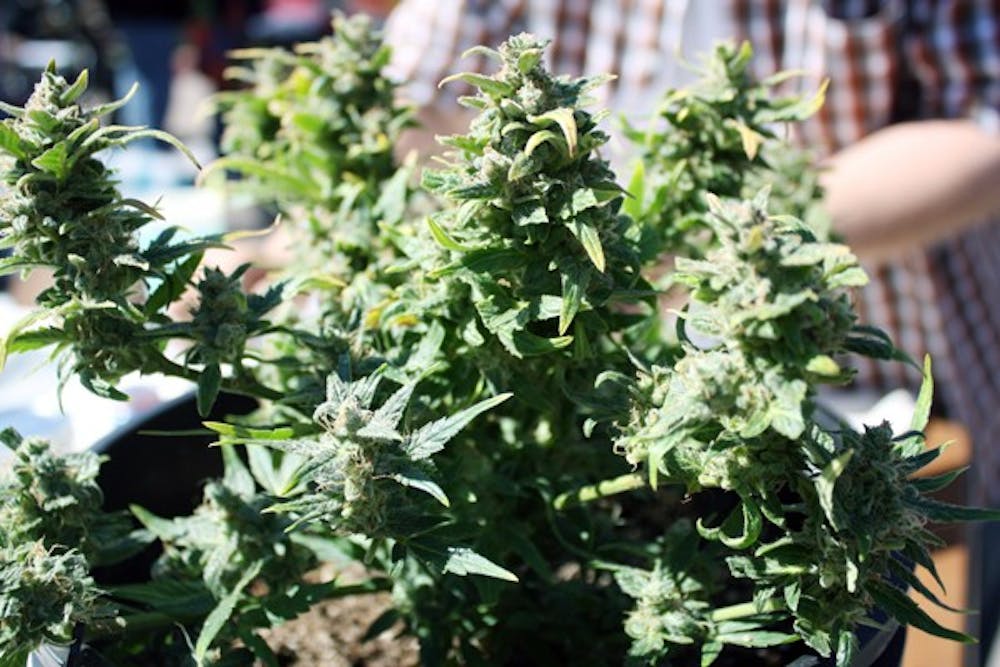Entrepreneurs are looking to tap into Arizona’s medical marijuana industry approved by voters in November 2010 with the close passage of Proposition 203.
A medical marijuana farmers market Saturday attracted prospective vendors who have yet to be given Arizona Department of Health Services’ approval to begin selling medical marijuana.
A lawsuit by Gov. Jan Brewer and another by Compassion First LLC delayed a portion of the Arizona Medical Marijuana Act, which allowed dispensaries to operate after Arizona Department of Heath Services approval.
Because of the dueling lawsuits, vendors have yet to be allowed to sell their products and were only permitted to accept monetary donations from patients in exchange for medical marijuana.
Event organizer Sunny Singh, owner of weGrow, a hydroponic store for medical marijuana cultivating on 29th Avenue and Thomas Road, opened his third location in June 2011, with others in Oakland and Sacramento.
Singh said weGrow offers many services such as doctor evaluations, hydroponic classes and also has a grow room technician team.
“Our store has really been thriving,” Singh said.
WeGrow, along with NORML, an activist organization aiming to reform marijuana laws, hosted the farmers market event for patients to connect with marijuana vendors
“The farmers market is a lot of caregivers, a lot of growers, a lot of exchanging and donating for one another and providing information to each other,” Singh said.
Singh said hosting the farmers market event gives patients resources to find medically and professionally grown marijuana because dispensaries are not open yet.
“This is probably the next best thing for them to come out here and network with one another,” Singh said.
Steven Valdez, a volunteer of Blue Leaf Cooperative, a nonprofit organization in its first year that connects medical marijuana patients to find medication at cheaper costs, attended the farmers market.
He said the organization hopes to set an example for the medical marijuana industry.
“We support our local police department. We support our community,” he said. “We want to set a good example for the opportunity we’ve been given.”
Valdez said the marijuana industry could help boost Arizona’s economy in the future.
“Why don’t we tax it?” he said. “Why don’t we use it to help? I think there’s so much potential, but it’s never told.”
Brian Beaudoin is a former physical therapist who now works as a caregiver for Baked Bliss, a delivery service company that specializes in baked marijuana edibles as medication for chronically ill or disabled patients.
Baked Bliss also accepted donations for their baked medical goods, ranging from Oreo brownies to lollipops.
While the company is not yet allowed to sell their products and services, they are able to keep Baked Bliss afloat by accepting donations from patients who can afford it.
These donations also subsidize patients who cannot afford medicinal marijuana as medication.
“When you go with us, part of what you pay for is going to go to help paying for other people because the sickest people don’t have any money,” Beaudoin said.
Beaudoin said Baked Bliss maintains a high level of professionalism and works diligently to provide high-quality products for patients.
“We’re not some drug dealers throwing baggies out the door,” he said.
Beaudoin said he has built strong relationships with cultivators, other caregivers and patients.
Beaudoin said a 70-year-old former cancer patient had never smoked marijuana in her entire life and had to be taught how to incorporate it into her medication plan.
“That’s one of the few things you can give them so they can still be coherent and still deal with the pain,” Beaudoin said.
Reach the reporter at kmmandev@asu.edu
Click here to subscribe to the daily State Press newsletter.





